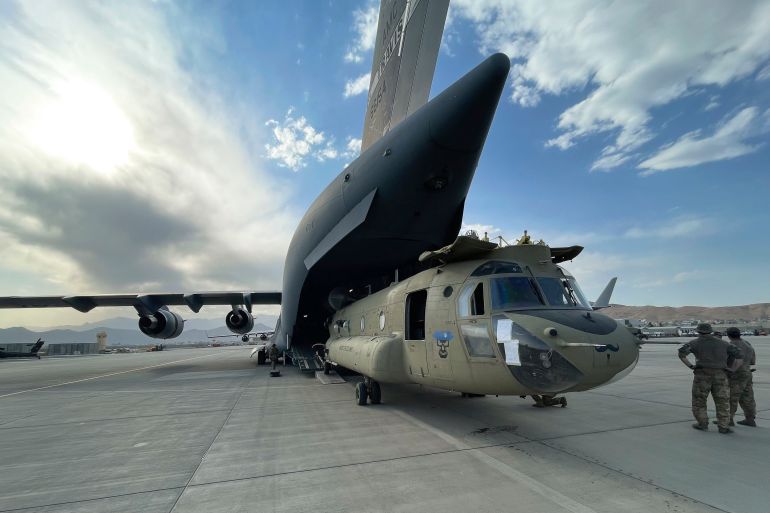US completes Afghanistan withdrawal as final flight leaves Kabul
Last flight signifies the ‘end of the nearly 20-year mission’ in Afghanistan, top United States general says.

The final US military flight has left the Afghan capital, the Pentagon has announced, officially ending the United States’s 20-year war in Afghanistan after a chaotic evacuation effort.
General Kenneth McKenzie, commander of US Central Command, said that the US evacuated 79,000 people from Kabul, including 6,000 American citizens, since August 14, a day before the Taliban took control of the city.
Keep reading
list of 3 itemsTurkey cannot take new refugee ‘burden’ from Afghanistan, says FM
Pakistani soldiers killed in cross border fire from Afghanistan
“I’m here to announce the completion of our withdrawal from Afghanistan,” McKenzie told reporters during a news briefing at the Pentagon on Monday.
“Tonight’s withdrawal signifies both the end of the military component of the evacuation but also the end of the nearly 20-year mission that began in Afghanistan shortly after September 11, 2001.”
The Taliban took over Afghanistan earlier this month after a blistering offensive, reaching Kabul on August 15 as President Ashraf Ghani fled the country and government forces collapsed.
US forces remained in control of the airport, however, as they worked to evacuate American citizens, third-country nationals and Afghan allies – and meet an August 31 troop withdrawal deadline set by President Joe Biden.
“Every single American service member is now out of Afghanistan. I can say that with absolute certainty,” McKenzie said on Monday.
The general added that US forces started the evacuations on August 14 with the assumption that Afghan security forces would be a “willing and able” partner, but the Taliban took over the capital a day later. That is when Washington started coordinating the evacuation efforts with the group.
“It’s important to understand that within 48 hours of the execution order, facts on the ground had changed significantly,” McKenzie said. “We have gone from cooperating on security with a longtime partner and ally to initiating a pragmatic relationship of necessity with a longtime enemy.”
Safe passage
Al Jazeera’s Gabriel Elizondo, reporting from Washington, DC, said McKenzie was extremely “frank” during the Pentagon briefing, telling reporters that the Taliban had been “helpful and useful” in the past few days, especially in helping to secure the airport.
“He was quite frankly … complimentary of the Taliban and their efforts,” he said. “But he did say that the US did not coordinate at all with the Taliban in terms of the exact time and date that the last planes left the airport.”
The Biden administration has said it remains committed to helping people leave Afghanistan after the withdrawal.
In a statement confirming the end of the US mission, Biden lauded the evacuation operation and vowed to work to ensure “safe passage” out of the country for Americans and eligible Afghans who may remain.
“The Taliban has made commitments on safe passage and the world will hold them to their commitments,” said Biden, adding that he would deliver a speech on Tuesday on why he decided against extending the withdrawal deadline, as urged by some US lawmakers and European allies.
The United Nations Security Council adopted a resolution earlier on Monday requiring the Taliban to honour their commitment to let people freely leave Afghanistan.
Over the past weeks, chaotic scenes have broken out at Kabul’s Hamid Karzai International Airport as desperate Afghans fearing Taliban repression sought to leave the country, spurring widespread criticism of the Biden administration.
An attack at the airport last week killed at least 175 people, including dozens of Afghan civilians and 13 US soldiers, and prompted a warning from Biden of more potential violence in the final days of the military withdrawal. Thursday’s deadly bombing was claimed by the Islamic State in Khorasan Province, ISKP (ISIS-K).
Biden ‘stands by’ withdrawal
Leading a coalition of international partners, the US invaded Afghanistan in 2001 after the 9/11 attacks in Washington, DC and New York. The Taliban, which was in control of Kabul, had been harbouring al-Qaeda leader Osama bin Laden.
US forces swiftly took over the country, but they struggled to defeat a guerrilla warfare campaign by the Taliban in the following 20 years.
With the war growing increasingly unpopular in the US, former President Donald Trump reached an agreement with the Taliban last year that would ensure the withdrawal of the American military from the country.
The deal also stipulated that Afghan authorities would “prevent the use of Afghan soil by any international terrorist groups or individuals against the security of the United States and its allies” and called for “intra-Afghan dialogue” between the Taliban and the government in Kabul.
Biden, who came to office in January, pushed on with the withdrawal plan, stressing that Afghan forces had the numbers, training and equipment to fight off the Taliban. But in early August, with the US withdrawal deadline approaching, provincial capitals began falling to the Taliban with little resistance from Afghan security forces.
Asfandyar Mir, an affiliate with the Center for International Security and Cooperation at Stanford University, called the US withdrawal a “historic moment” in the post-9/11 era.
“From a US perspective, it is one of the lowest points for US foreign policy, national security, in recent memory,” he said, pointing to the swift collapse of the Afghan government and the chaotic evacuations.
“I think it is inescapable that all of this is tremendously humiliating,” Mir told Al Jazeera.
Earlier on Monday, White House spokeswoman Jen Psaki said Biden does not regret the withdrawal decision, however.
“The president stands by his decision to bring our men and women home from Afghanistan because if he had not … we would have sent tens of thousands potentially, or thousands at least more troops, back into harm’s way, risking more lives and more people to fight a war the Afghans were not willing to fight themselves,” Psaki said.